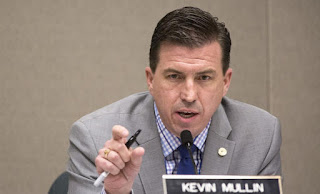In an email early today to the producers of the lengthy video, Maria Millan referred to an appeal for her to reconsider her previous request to back out of the "docu-series."
"I am not swayed by the letter from Mark Berman of Cell Surgical Network and, in fact, it deepens my concern. I maintain the same position and concerns expressed in my note dated June 15. Please remove my interview from the documentary and my picture and name from any associated materials —including this link- please remove me as an “episode expert” on https://www.healthcarerev.org/?inf_contact_key=efe318f527b6ecd43046adebf597cfd9."The video, titled the "Healthcare Revolution" was partly financed by Cell Surgical Network, which has offices in Beverly Hills and Rancho Mirage, Ca., plus about 100 affiliates nationwide. The Food and Drug Administration(FDA)has sued the firm to halt what the FDA says are unproven and potentially dangerous treatments.
A number of researchers and others pictured in the video have also asked to be removed, saying they were misled about how their interviews would be used. San Diego-area stem cell researcher Jeanne Loring declared that being in the video placed her among "charlatans and thieves" who prey on desperate patients.
Kevin McCormack, senior director of communications for the California Institute for Regenerative Medicine (CIRM), as the stem cell agency is formally known, explained what led to the agency's involvement with the video producers, Bobby and Sara Sheehan. In response to questions from the California Stem Cell Report, McCormack said,
"When the Sheehans asked us to be part of the series we looked at previous work they had done and reviewed the questions they wanted to ask. We knew they were going to talk to a wide range of people for the series but we were sufficiently reassured that we initially agreed to the interviews feeling it was important to have our voice heard.
"However, once we learned who was partially funding the project and saw the trailer we felt it risked giving a distorted view for anyone who saw it and that it inadvertently legitimized opportunistic, bad actors. It’s unfortunate these so-called 'clinics' are trying to hijack the reputation of legitimate stem cell therapies and cash in on scientists who are doing serious, scientifically sound research....
"I think the fact that virtually all of the highly regarded scientists interviewed for the series have withdrawn from it, people like UC San Diego’s Larry Goldstein and Scripps Jeanne Loring, says everything that needs to be said. None of us who have spent years warning the public about the dangers of going to clinics offering unproven and unapproved stem cell therapies want anything to do with something that equates FDA-sanctioned clinical trials with unsanctioned and unregulated stem cell therapies."The flap over the video comes as the number of dubious stem cell clinics is estimated to exceed 1,000 nationally, with the highest percentage in California. The state has been slow to regulate the clinics whose treatments have reportedly led to illness and blindness. Legislation aimed at the clinics is all but dead in the legislature, leaving the regulation solely in the hands of the state Medical Board.
The board said today that it has no authority over clinics -- only physicians. The board has been mulling over the matter for about 11 months. But its two-person "task force" has yet to schedule a public meeting.









